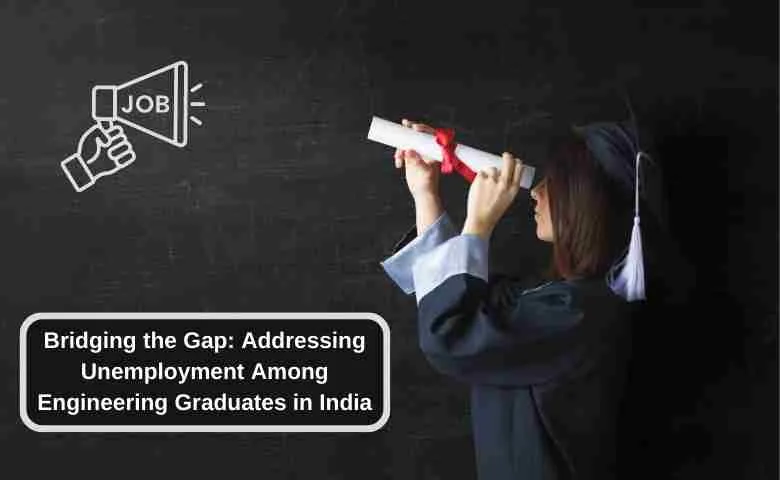Last Updated on May 22, 2023 by Admin
India, often celebrated as the hub of technology and innovation in the global arena, is home to one of the world’s largest technical workforces. The country proudly stands as the breeding ground for approximately 2 million engineering graduates annually, underscoring the profound intellectual prowess and academic potential within the nation’s borders. But beneath the surface of these impressive figures lies a grim reality — a significant unemployment crisis among these young professionals.
Table of Contents
Understanding the Employment Landscape
In 2023, Indian engineering graduates’ employability had shown a promising increase to about 57 percent from the 46 percent recorded in 2021. However, this silver lining is marred by a persistent cloud, as the overall employability of the country’s youth remained stagnant at approximately 46 percent over the past four years. These numbers signal a looming challenge that demands immediate attention and thoughtful solutions.
Related Courses:
- BIM for Construction Online Course by Purdue University
- Virtual Building Design for Engineers Using Autodesk Revit
- Construction Management Specialization by The University of Maryland
- The Industry and Profession in Construction Management
Grappling with the Reality of Unemployment
To understand the gravity of the problem, let’s delve deeper into some stark revelations from past studies. A survey conducted by the National Association of Software and Service Companies (NASSCOM) in 2019 unveiled that of the 1.5 million (15 lakhs) engineering graduates churned out every year, only 250,000 (2.5 lakhs) secure jobs. This figure resonates with the sentiment expressed by Rajiv Kumar, the former Vice-Chairman of Niti Aayog, who stated that nearly 48% of the country’s engineering students are unemployed.
Unveiling the Root Causes
The reasons contributing to this alarming rate of unemployment are manifold.
At the forefront is the significant oversupply of engineering graduates. As India proudly produces nearly 2 million engineering graduates annually, the market becomes saturated, resulting in many candidates and intense competition. With numerous graduates vying for limited job openings, securing employment becomes a Herculean task.
Moreover, while Indian education provides robust theoretical knowledge, many graduates fall short in practical skills, an essential requirement in today’s job market. This deficiency, primarily due to an overemphasis on theoretical understanding in colleges and universities, results in graduates who may not meet industry standards.
Another critical factor affecting the employability of these graduates is their communication skills. A survey highlighted that while engineering graduates possess a strong foundation of technical knowledge, they often falter in expressing their ideas clearly and effectively, reducing their chances of landing a job.
Finally, the rapid pace of technological advancement poses another challenge. The current era, characterized by continuous technological evolution, requires constant learning and upgrading of skills. Many engineering graduates struggle to keep up with these fast-paced advancements, becoming less relevant in the industry.
Related Posts:
- Economic Factors Affecting Salaries in the Construction Industry
- What You Need for a Successful Civil Engineering Career: Top Skills and Expertise
- All you need to know about Apprenticeship Training in India
- Civil Engineering Careers Blueprint eBook – The Great Construction Career
Solutions to the Problem
So, what’s the way forward?
Fortunately, the issue of graduate unemployment is witnessing some positive changes, mainly due to the digital revolution. Job placement portals are reaching deeper into Tier II and III cities, linking job seekers with potential employers.
Enhancing Practical Skills and Vocational Education
A focus on practical skills and vocational education is also advised. Shifting the focus from lofty academic learning to applied education would equip graduates with in-demand skills, making them more employable.
Initiatives from the Ministry of Skill Development and Entrepreneurship
The Ministry of Skill Development and Entrepreneurship, in an attempt to mitigate the crisis, has launched various schemes. These include training initiatives, subsidies for training centers in small towns, and the introduction of online skill training. Such measures equip graduates with practical knowledge and help them keep pace with the latest technological trends.
Related Courses:
- Data Science for Construction, Architecture and Engineering
- Sustainable Construction Management
- Project Delivery Methods and Contracts in Construction Management
- Façade design and engineering: complexity made simple
Necessary Policy Changes
On a broader level, it’s high time to consider policy changes to maximize citizen benefits. Initiatives are necessary to control population growth and ensure transparency in job and job seeker information. Further, labor-intensive technologies should be promoted to facilitate economic progress and provide an impetus to self-employment.
Conclusion
In conclusion, although the issue of unemployment among engineering graduates is a significant concern in India, it is not an insurmountable problem. By adopting strategic changes in education and employment policies, emphasizing practical skills, and promoting lifelong learning, the nation can bridge the gap between education and employment. Let’s take these necessary strides to address the crisis head-on and ensure a promising future for the bright minds that India produces every year.
Related Posts:
- Real Estate Jobs and Career Opportunity In India
- Walk-in Interviews in 2023 | Various Construction Engineering Jobs
- Navigating a Career Change into the Construction Industry: A Comprehensive Guide
- Career in Water Resource Management: Pathways, Roles, and Opportunities
- Waste Management Careers: A Comprehensive Guide to Jobs, Skills, and Career Progression
- 25 Crucial Questions and Answers: Decoding Civil Engineering Careers in India
- Government Engineering Jobs | Application Deadlines [2023 Updated]
- Top 25 AEC Companies in India | AEC Firms India [2023 Updated List]
- Types of Civil Engineering Jobs: Exploring Diverse Career Paths, Opportunities, and Salaries in 2023
- Building Your Career: Timing Your Construction Management Education for Maximum Impact and Success


